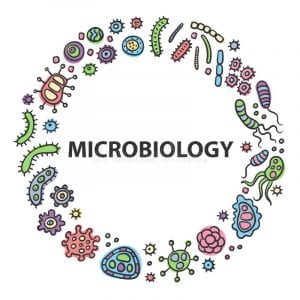MSc Microbiology Career Opportunities And Scope In India
The current pandemic caused by the SARS-CoV-2 virus has revealed the deadly roles played by microorganisms, but these unseen organisms can be tamed only with the inputs of a microbiology student. Apart from causing diseases, microbes have crucial roles in food production, environmental science, medicine, and basic research. Recently, the Microbiology course attained immense popularity due to an increase in the number of students coming forward to pursue microbiology as a career.

Who are Microbiologists?
Microbiology was born in the year of 1674 when Antonie van Leeuwenhoek became the first microbiologist to observe microbes in a drop of water through a glass lens. Since then, this science studying the invisible life has grown boundlessly. A person who specializes in the field of microbiology is called a microbiologist. Microbiologists are regarded as scientists or researchers who play a pivotal role in studying various microorganisms and infectious agents that cannot be seen with the naked eye.
They also study the interactions of microorganisms with humans and other animals that affect our lives.
Microbiologists play a very crucial role in the food industry as they check the food’s safety, develop green technologies, and track the
role of microbes in climate change. They have an in-depth knowledge of microorganisms such as bacteria, viruses, algae, fungi, and some types of parasites. Accordingly, they are named as follows:Bacteriologists are the ones who conduct research experiments and learn more about microorganisms’ behavior, their ecology, metabolism, and reproduction.
Virologists diagnose viral infections and study the biology of viruses, their distribution, biochemistry, physiology, response to antiviral drugs along with mechanisms of drug resistance. They give expert advice on how antiviral drugs should be prescribed and used appropriately.
Mycologists study the biochemical properties, genetics, use, and dangers of fungus to humans. There are medical mycologists who research on drugs to cure fungal infections, and there are agricultural and research mycologists who study the industrial and economic uses of fungi.
Parasitologists study all about parasites, their life cycle, genetics, reproduction, infestation, and their complete biology. He is the one who examines the relationship between host and parasite.
Clinical microbiologists have to perform laboratory research related to the prevention, diagnosis, and treatment of infectious diseases caused by microscopic organisms, like bacteria and fungi.
Environmental microbiologists study the composition and physiology of microbial communities in soil, water, air, and sediments. Their study also includes the animals and plants that inhabit these areas.
Industrial microbiologists use microorganisms for industrial production processes like the discovery of new organisms and pathways, such as antimicrobial drugs. They monitor the impact of industrial waste on the surroundings and ensure the quality production of cheese and alcohol, among others.
Career Opportunities After MSc Microbiology:
Researcher- A microbiology researcher finds solutions to problems related to microbes. They perform a detailed study in areas of microbial usage in industrial processes, how a particular microorganism causes diseases in animals or humans, their transmission, so on. They are also entrusted with the task of writing proposals to get grant funding or analyzing data and publishing results in scientific journals and presenting at scientific conferences. The microbiology research job titles include research associate, research scientist, technician, laboratory manager, scientist, and principal investigator.
Food technologists- They are of great demand in food industries as they make sure that the food quality is maintained by following the guidelines of food production regulations. They ensure food products are produced safely, legally, and with no compromise on the quality claimed. They even modify foods to create products such as fat-free food items, instant meals, and so on.
Microbiologist- As a microbiologist, one studies the biology of microorganisms at both the molecular and cellular levels, including their ecology. There are different areas of specialization, which include medicine, healthcare, agriculture, climate change, and food safety.
Diagnostics- Microbiology graduates can work as clinical laboratory professionals. These professionals are employed in hospitals, public health laboratories, private diagnostic laboratories, and private companies. In hospitals and laboratories, they perform pathological tests on human or animal samples sent in by doctors or vets. These tests are useful in identifying the microbe and helps the doctor/vet with treatment decisions, whether a microbe is sensitive or resistant to antimicrobial medicines like antibiotics.
Biosafety- Microbiology students can also work as biosafety professionals wherein the knowledge and skill gained by them to isolate, manipulate, and propagate pathogenic microorganisms are utilized to lay down regulations, facility designs, practices to prevent occupational diseases in work areas and release of harmful organisms in the environment.
Quality Control (Microbiology)- Microbiology Quality Control Technicians are responsible for maintaining the quality of the company’s product through all day-to-day operations. They evaluate the quality of raw materials, other supplies, and check the finished, packaged product. They have to ensure compliance with common Good Manufacturing Practices. Quality Control Technicians also help in calibrating and maintaining the microbiology laboratory equipment; summarize and analyze data for documentation, and prepare standard reports. With experience, the technicians are further promoted to different managerial levels. MSc Microbiology holders can build a great career in this field.
Scientific writers– They are microbiology graduates who have a flair for writing for newspapers, magazines, and scientific journals. They work with media companies, as well as for government institutions. Some also work as freelancers. They compile research stories and write articles on current events in the field of microbiology and new research being published.
Patent lawyers- Microbiology graduates can also find opportunities at law firms or private companies. They are entitled to protect intellectual property by writing and filing patents on the development of new scientific devices, methods, or products. They also pursue or defend lawsuits related to patent infringement. Patent lawyers also pursue a law degree as well as scientific expertise.
Science education or outreach professionals- Many microbiology graduates work at various colleges and universities, museums, government agencies, private firms, and non-profit organizations. These professionals design and organize programs and events that engage the public or students with science.
Scope Of Microbiology In India
India is still a developing nation, and its large population suffers from many dreadful diseases like malaria, tuberculosis, cholera, and HIV infection. This, in turn, is mostly caused due to the multiple drug resistance (MDR) mechanisms in the causative organisms.
Indian microbiologists are currently entrusted with the task of understanding the mechanism by which organisms acquire this drug resistance, and hence attempting to identify new drugs and blocking pathways for such pathogenic MDR bacterial strains. Extensive study in this area, in a number of premier research and hospitals with advanced scientific inputs and lower cost of conducting medical practices, is expected to bring Indian microbiology to the forefront.
After studying MSc Microbiology, there are various career opportunities in India. At present, the scientific knowledge, problem-solving, and analytical skills of microbiology graduates are sought after by employers. Currently and in the post coronavirus era, there is a wide scope in the field of microbiology because of the advancement in the field of science and technology and the need for research on deadly disease-causing microorganisms.
There is an ever-increasing demand for microbiologists in India and globally. A microbiologist invents new diagnostic kits, finds treatment for diseases by discovering new drugs, research, etc. To further perform cutting edge research in microbiology after graduation, one can also think of pursuing a PhD in microbiology. A PhD degree further opens doors for new avenues in microbiology.
As India is an agrarian economy, microbiological research that ensures food and nutrition to people is always in demand. This further involves studies on topics like nitrogen fixation, rhizosphere, anaerobic decomposition in biogas production, soil enzymes, etc. Moreover, several government agencies like the Indian Council of Agricultural Research and Indian Agricultural Research Institute, which are networks of agricultural research, are continuously into research for the development of improved crops with resistance against various stress factors, be it pathogens, frost, the heat so on. One can enter both the government as well as private sectors.
Therefore, with a degree in microbiology, one can get opportunities in various environments like higher education institutions, hospitals, healthcare organizations, forensic science laboratories, environmental organizations, publicly funded research organizations, pharmaceuticals, food and drugs, and many other industries.
More recently, microbial genetics has been an upcoming field. Several eukaryotic, as well as bacterial genomes, are getting sequenced, and there is a demand for metagenomic studies in the country. The impact of these studies will be realized in the coming years.
The scope of microbiology is immense as its applications are in diverse fields like medicine, dairy, agriculture, clinical research, water industry, chemical technology, and nanotechnology.
Listed below are few companies and organizations which provide jobs in different areas:
| Employment Areas: | Top Companies |
| Pharmaceutical Industries | Dr Reddy’s, Sun Pharma, Novo Nordisk, Lupin, Panacea Biotech, Parexel, GSK, Johnson & Johnson, Sanofi, AstraZeneca |
| Biotechnology Companies | Biocon, Novozymes |
| Contract Research Organization | Syngene, ICON, PPD, Clintec, Covance, Medpace |
| Universities | Osmania University, Panjab University, Sardar Patel University |
| Laboratories | Sami Labs, Sigma, Biocare Research, SRL Diagnostics |
| Private Hospitals | Global Hospitals, Wockhardt Hospitals, Lilavati Hospital & Research Centre, Apollo Hospital |
| Research Organizations | CSIR–CSMCRI, CSIR-IGIB, CSIR-CDRI, CSIR-CFTRI, CSIR-CIMAP, ICMR, ICMR–RMRC, ICMR-NIV, ICMR-NIRRH, ICMR-NARI, ICAR-IVRI, ICAR-IARI, ICAR-NBPGR, ICGEB, PGIMER, ACTREC, IISER-Pune, IISER Mohali, IISER Kolkata, IISER-TVM, IISER-Tirupati, NBRC, IISc, CBR, NIAB, NABI, NIFTEM, inStem, NCBS, IIFPT, FSSAI, IIT Kharagpur, IIT Delhi, IIT Jodhpur, DRDO-DRDE, CTRTI, NHM, NCERT, NCL Pune |
| Environmental Agencies | Tamil Nadu Pollution Control Board, Chilika Development Authority, Gujarat Energy Research & Management Institute, Central Pollution Control Board |
| Food Industry | Amul, Cafe Coffee Day, Suguna Foods, Mondelez, Heritage Foods, McCain, Mars Incorporated |
| Beverage Industry | Coca-cola, Tata Tea, PepsiCo, South Seas Distilleries & Breweries, Diageo |
| Chemical Industries | Pidilite Industries Ltd, Tata Chemicals Ltd, Aarti Industries Ltd, India Glycols Ltd |
| Agriculture Department | DuPont India, National Agro-Industry, PI Industries, Kemin Industries |
Skills Required For A Successful Career After MSc Microbiology
Certification may help the freshers in microbiology to gain employment benefits in the occupation or advance to new positions of responsibility. Microbiologists interested in the food sector can join degree apprenticeships in food technology, which is available from the Institute of Food Science and Technology (IFST). Some employers prefer to hire quality control technicians who are certified by the American Society for Quality for various aspects of the quality control profession.
Having laboratory experience adds to the prospects of being selected in the microbiology research workforce. Microbiology students gain valuable laboratory experience through a six months internship program with prospective employers, such as drug manufacturers, as part of their curriculum. Summer training programs at various companies also help to show laboratory experience for job needs.
Important qualities for microbiologists include good communication skills so as to effectively communicate their research processes. They should be detailed oriented with interpersonal skills. Microbiologists should have the basic qualities of perseverance, problem-solving skills, and the most important one is to possess time management skills as it is a must for them to meet deadlines when conducting research and laboratory tests. One can join as a member of a relevant society or a professional body such as the Microbiology Society and the Society for Applied Microbiology (SfAM), which would increase the networking of the microbiologists for job recruitments.
Average Salary In India For Careers After MSc In Microbiology
The average salary for MSc Microbiology pass-outs varies based on their experience and job position. The valuation of the candidate depends on the sector of employment, job profile, experience, and diligence at the workplace.
Average Salary Package Msc Microbiology Candidates can get at various positions
(Can vary with the organization, position, city & other factors)
| Microbiologist | Rs 350K |
| Assistant professor | Rs 480K |
| Scientific Writers | Rs 320K |
| Assistant Manager of Quality Control | Rs 657K |
| Medical coder | Rs 277K |
| Quality Assurance, Quality Control Inspector | Rs 216K |
| Copy Editor | Rs 321K |
| Clinical Research Associate | Rs 300K |
Pros of becoming a Microbiologist
- Microbiologists are required in most aspects of the R&D Industry.
- Microbiologist has flexible working conditions.
- Microbiologists always have a career in the food industry, beverage industry, medical and healthcare industry.
- Microbiologists are an evergreen option as a career choice because no matter how the world changes, microorganisms are here to stay so you will always have a job vacancy awaiting you.
- Microbiology is so vast, that you can choose to specialize in any one aspect of it and still have a lucrative career.
- Work is never monotonous.
- A microbiologist can easily switch up their job since they are required in most aspects of R&D, Healthcare, FMCG, Food & Beverage Industry.
- A microbiologist can always build upon their skills and thus have an advantage when pursuing research careers.
Cons of becoming a Microbiologist
- They face a highly competitive job market.
Microbiology initially involved the studies related to fermentation and medicine, but as the diversity and the role of the microbes came into light, the scientific basis of this science has surpassed all boundaries. In an attempt to harness the potential of these ‘wonder bugs,’ it has created numerous career opportunities for MSc Microbiology holders.










































Thanks a lot. Because many of time I am just thinking that why I choose microbiology nd by opting this course what can I do in my future. I am always thinking that can I got jon or not in this field. But now I feel good .
Can you please share the career options for after msc biotechnology
how to be a assistant professor ?